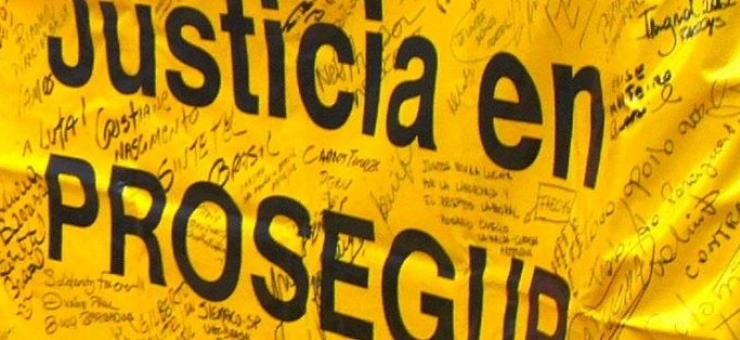Third anniversary of mass dismissal by Prosegur in Paraguay

30 July 2015 marks the third anniversary of the mass dismissal that left more than 300 Prosegur Paraguay workers and their families without an income. The 327 workers belonging to the trade union SITEPROPASA were dismissed in 2012, in Paraguay, for no other reason but for establishing a legal trade union and demanding a collective agreement, decent working conditions and the right to strike.
As a result of inhumane working conditions and working days of up to 18 hours, workers went out on an eight-day strike. According to Roberto Florentín, a SITEPROPASA leader, workers were forced to urinate in bottles in their armoured vehicles as they were denied access to toilet facilities.
The strike was called off after eight days when the then Minister of Labour, María Lorena Segovia Azucas, offered to act as mediator in the dispute, and the company offered to negotiate if workers returned to their posts. Workers called off the strike and were to return to their posts on Monday, 30 July 2012.
As soon as the strike was called off, a human resource assistant at the firm circulated a list indicating the shifts and hours of those returning to work on Monday, 30 July. Everything was done to lead workers to believe that their jobs were safe.
However, when they turned up for work at Prosegur’s premises, they were informed by the firm’s lawyers and notaries that the strike had been illegal, and that anyone who did not agree to an immediate severance package would face dismissal without pay.
Over the past three years, not a single court in Paraguay has found that the strike by Prosegur workers was illegal.
In October 2012, UNI filed a complaint against Paraguay to the International Labour Organization (ILO), for failing to protect the fundamental rights of workers. In 2015, the ILO (Committee on Freedom of Association) requested that the Government of Paraguay take urgent steps to investigate all the facts pertaining to the mass dismissal of Prosegur workers. Still no answers have been forthcoming.
The Spanish multinational firm has been accused several times of committing human rights abuses in various Latin American countries. In November 2013, UNI filed a complaint against Prosegur to the Organisation for Economic Co-operation and Development (OECD) for violating OECD guidelines in Paraguay, Colombia, Peru, and Brazil.
Nevertheless, to this day, over 300 workers are still without work and without answers. Over the past three years, SITEPROPASA and UNI have called for justice for workers from Prosegur Paraguay and elsewhere in the world where their human rights continue to be abused by the Spanish company.

